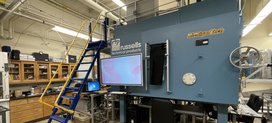
With head in the clouds: The UFT ultrafast thermometer fine-scale temperature measurements at The Pi Cloud Chamber
As part of a research collaboration between Professor Szymon Malinowski of the IGF FUW Atmospheric Physics Department and Professor Raymond Shaw of Michigan Technological University in Houghton, USA, who directs the Atmospheric Sciences Ph.D. Program, our doctoral student Robert Grosz completed two research internships at Michigan Tech, where he actively participated in experiments using the unique Pi Chamber. During the periods September-December 2022 and May-August 2023, Robert was a member of Professor Shaw's group at The Cloud Physics Lab, and the research conducted as part of the internships is a very important part of his PhD.
Professor Shaw's research interests, like Professor Malinowski's, revolve around the physics of the Earth's atmosphere, with an emphasis on cloud phenomena and experimental tools for studying them. Led by Raymond Shaw, the group at The Cloud Physics Lab is interested, among other things, in studying the effects of turbulence on the growth of cloud particles (droplets and/or ice crystals) through condensation and collisions, and in understanding the freezing process. In this process, cloud droplets in the presence of so-called crystallization nuclei freeze and form ice crystals. For this purpose, a special cloud chamber was built at Michigan Tech, where Prof. Shaw's group can conduct unique studies of cloud processes under controlled laboratory conditions. Prof. Shaw and members of his group's scientific achievements also include work on modeling and theoretical analyses of cloud processes, various aspects of aerosol effects on atmospheric phenomena, as well as research with laser spectroscopy methods. Their experience also extends to research in the free atmosphere, as shown, among other things, by the joint publications of Prof. Shaw and Prof. Malinowski from previous measurement campaigns.
Real clouds are ephemeral, constantly evolving, and not easily accessible to scientists wanting to learn more about their inner workings. Therefore, one way to study them is to create clouds in laboratories. The Pi Chamber cloud chamber makes it possible to generate clouds under almost any thermodynamic conditions that may exist in the lower layer of the Earth's atmosphere, the troposphere. What's more, these conditions are reproducible and fully controlled, allowing multi-faceted analysis of the same phenomena using sophisticated laboratory apparatus that cannot be used in aerial measurements. At the same time, Pi Chamber is an ideal environment for testing hypotheses posed by scientists working on the theoretical aspect of atmospheric physics. Each wall has subsystems that allow its temperature to be controlled and the numerous inputs inside the chamber allow for a very large number of measurement variations, which is often used. The Pi Chamber refers to the number Pi in its name, in connection with the dimensions of its measurement volume, which is about 3.14 m3, taking into account an extendable cylinder with a diameter of 2 m and a height of 1 m. It also happened to be delivered to Michigan Tech on March 14, which is Pi Number Day, celebrated mainly in American academic and school circles. The chamber was designed and built in cooperation with Russells Technical Products in Holland, Michigan.
Robert's research in the Pi Chamber chamber focused specifically on fine-scale temperature measurements using one of our ultrafast UFT thermometers. Our doctoral student's task was to use the thermometer to make horizontal and vertical scans inside the chamber under different thermodynamic conditions, i.e. with and without aerosol, with and without cloud droplets, and at different temperature gradients in the chamber. Scans should be understood as systematic changes in the position of the sensor relative to the chamber over a preset range of positions.
A sizable data set was collected from the research, which was also aided by parallel measurements by a research group from the University of Notre Dame of Indiana, which focused on studying the gravitational settling of aerosol, and more specifically glass particles, at different temperature gradients inside the chamber. Robert also assisted Professor Shaw's team with the calibration and initial measurements of the new Particle Tracking Velocimetry (PTV) system. The system was purchased in May 2022 and entrusted to Robert's care for the duration of his Michigan Tech residency. He was able to calibrate the system and teach the repeatability of this activity, mount it in a cloud chamber, and take preliminary measurements with droplets.
Scientific consultation:
mgr Robert Grosz
prof. dr hab. Szymon Malinowski
Links:
https://en.wikipedia.org/wiki/Particle_tracking_velocimetry
https://www.mtu.edu/physics/department/faculty/shaw/
https://phy.sites.mtu.edu/cloudchamber/
https://phy.sites.mtu.edu/shaw/
https://efmlab.nd.edu/research/
Originally published on - Sept. 11, 2023, 8 a.m.
Last update on - Sept. 19, 2023, 9:31 a.m.
Publisher - Dąbrówka Stępniewska
PHOTO GALLERY

